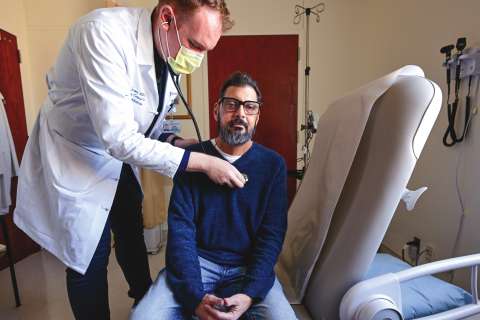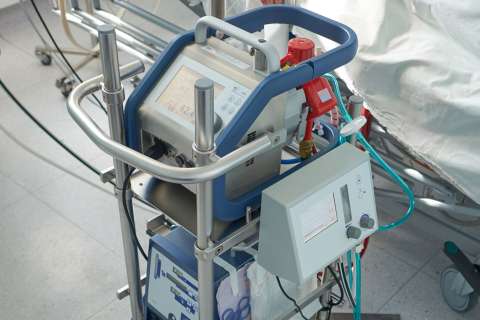For the last several years, one class of drugs has consistently ranked among the top medications in the United States. Physicians prescribe statins to more than 90 million Americans to lower cholesterol levels and decrease the risk of cardiovascular disease. Like any medication, it can have side effects, such as headache, nausea or bloating.
But for some people, side effects are severe. Taking statins can result in muscle pain and weakness, and even a greater susceptibility to developing type II diabetes. It’s known that women are more likely to experience these adverse effects, which can be so debilitating they stop taking the medication altogether.
“This is concerning, particularly as heart disease is on the rise in younger women disproportionately to men,” said Karen Reue, PhD, vice chair of the Department of Human Genetics in the David Geffen School of Medicine at UCLA. “We were very interested in trying to understand why that is – and to identify ways to reduce statin side effects in females.”
Dr. Reue’s lab is one of two programs at UCLA Health designated as a Specialized Center of Research Excellence (SCORE) to study the role of sex differences and major medical conditions affecting women. Co-principal investigators Lin Chang, MD, and Emeran Mayer, MD, PhD, lead the other SCORE, which studies sex differences in brain-gut microbiome interactions in irritable bowel syndrome (IBS).
The National Institutes of Health awarded the highly competitive SCORE grant to 12 programs nationwide. UCLA Health is the only institution with two separate research groups recognized as a SCORE, and both are multiyear grant awardees.
“Men and women could have different disease pathogenesis, different risk levels and different responses to treatments,” said Dr. Chang, vice chief of the Vatche and Tamar Manoukian Division of Digestive Diseases. “You really have to consider sex as a biological variable.”
Biological variables include unique characteristics such as age, blood group and weight. Perhaps none has been as disproportionately represented as sex. In an effort to balance an overreliance on male animals and cells in research, the NIH expects the 80,000 grant applications it receives every year to consider both sexes – or provide strong justification for only studying one.
“Still to this day, the default human or model set we have is the 70 kilogram male,” said Vivian Ota Wang, PhD, deputy director at the NIH Office of Research on Women's Health, speaking at the annual UCLA SCORE Symposium. “The baseline data is inadequate. It results in too little research on diseases and conditions that actually create a huge chasm around understanding women and women’s health.”
Brain-gut disorder
The NIH policy on sex as a biological variable (SABV) was put in place in 2016. But Dr. Chang and her associates have been researching the biological variable in IBS, and more recently chronic functional constipation, for the last two decades. Their SCORE grant, first awarded in 2002, has been renewed every five years.
IBS is a common disorder that affects up to 10% of the population worldwide. The main symptoms include abdominal pain and changes in bowel movements. But unlike other digestive diseases, there is no structural abnormality or obvious inflammation.
“It's hard to get grant funding on this condition,” said Dr. Chang, also a professor of medicine at the David Geffen School of Medicine at UCLA. “And the reasons why, I believe, are because it’s a symptom-based disorder without a reliable diagnostic biomarker and it’s multifactorial, complex and heterogeneous. Funding typically rewards grants that are studying a very mechanistic, focused pathway.”
In the last two decades, Drs. Chang’s and Mayer’s group has shown that there are distinct differences between the sexes. Women with IBS have a lower pain threshold. Women and men with IBS may also activate different brain regions involved in the perception of pain and the salience and emotional arousal of sensory information, although these responses can depend on the type of stimulus or stressor.
Men have a greater fight-or-flight response, or autonomic nervous system response, that is manifested by changes in heart rate. And in imaging studies of the brain, women with IBS may have structural or functional abnormalities in the sensorimotor cortex, which is tied to pain.
These studies showed how the brain and symptoms in the gut are connected, and Dr. Chang said they helped re-classify IBS, in 2016, from a “functional bowel disorder” to a brain-gut disorder.
“We want to identify novel actionable biomarkers and therapeutic targets,” said Dr. Chang. “We're using wearables to measure heart rate variability, which we already know has a sex difference. So we want to see if that can predict symptom flares.”
Another actionable therapy could be directed to the gut microbiome. If the researchers can identify metabolites that are associated with low abdominal pain or high pain, it may be possible to introduce a novel probiotic or a metabolite that can either work in the gut or signal to the brain to reduce symptoms.
Dr. Chang’s lab is also studying the effects of estrogen on the brain in patients with IBS. The hormone may have a dual role: fluctuations in estrogen metabolites can contribute to higher or lower levels of perceived pain. This is especially important during the latter part of the menstrual cycle when women have more gastrointestinal symptoms and in postmenopausal women with lower estrogen levels.
“We have found that postmenopausal women with IBS have a higher severity of symptoms than premenopausal women, and more than what you see in comparably aged men,” said Dr. Chang. “For younger men and older men, there's not much difference in their symptoms, which tells you it's not an age effect. It could be a hormonal effect.”
Cardiometabolism
Applying for her first SCORE grant was last minute for Dr. Reue. By the time she heard about the award, the due date was just weeks away. Researchers will typically prepare a grant application for several months.
“I remember spending my Christmas break working on that,” said Dr. Reue. “I was shocked because we got it on our first try and we were competing against groups that had many cycles of the grant.”
Her lab’s SCORE grant was recently renewed for another five years.
Dr. Reue has been studying metabolism and metabolic diseases, such as obesity, diabetes and atherosclerosis, her entire career. Sex differences were always present, so a dozen years ago she focused exclusively on them.
“Typically, one sex or the other is more protected (from disease) than the other, said Dr. Reue. “If we could understand why that is mechanistically, that might open up therapeutic windows to help everybody.”
That’s especially true when considering adverse drug effects, such as for statins, in which females are more susceptible to muscle pain and weakness, and developing type II diabetes.
Dr. Reue modeled that in male and female mice, and then delved into their genomes to understand why. Her group found that levels of an omega-3 fatty acid were plummeting in female mice on statins. Giving them fish oil prevented the adverse effects. Their findings were published this July in Nature Communications.
The results translated to humans. A collaborator at Stanford measured blood samples before and after statins, and found the same reduced levels of the fatty acid in women.
“Those physicians now want to do a clinical trial to see if could prevent the adverse effects,” said Dr. Reue. “But you couldn't get down to those mechanisms very easily by starting with human studies.”
Her research team is divided into three groups, each studying from a different angle disease processes between males and females. One is characterizing hormonal influences. Another is looking at gene-by-sex interactions, the impact of sex on gene expression.
Dr. Reue’s project focuses on the X and Y genes that have different expression levels between females and males, which she found has significant effects on cardiometabolic traits.
Until recently, it was thought that one of the X chromosomes in females was largely switched off, with all gene expression coming from the other chromosome. But Dr. Reue and others’ research found the first chromosome was not so silent after all. A small number of genes escape inactivation, and many are the same in both mouse and human genomes.
“These X escape genes influence fat accumulation in the body, they influence response to drugs, they influence atherosclerosis,” said Dr. Reue. “It's just amazing what they do. And what we're focused on now is to find the genomic targets acted on by the proteins made by those X genes and how they contribute to differences between males and females.”
Next generation
An important aspect of the SCORE grant is education and training to foster a new generation of researchers studying sex differences.
Members of the Reue SCORE are starting them young, with a 10-week elective offered to college students by Arthur Arnold, PhD, a professor of integrative biology and physiology, and long-time researcher on sex differences.
“We decided that our secret sauce is to introduce SABV at the undergraduate level in a very formal way,” Dr. Reue said. “The students really get that this is an interesting part of biology and it applies to almost any disease you're interested in.”
But she and her colleagues are also hoping to educate those who are already researchers and may see incorporating sex differences as too complicated.
“We've literally given lectures that are titled ‘My mouse has a sex difference. Now what do I do?’” said Dr. Reue. “And so we can teach them about some of the cool tools that are available to study sex differences. We just want to break down some of the barriers so people aren't afraid to include this in their research.”
Dr. Chang, who is also program director of the GI Fellowship program, said students, residents and fellows, many of whom never even thought about sex differences, are now working on that type of research.
“When I started in the field, IBS was incorrectly referred to as a disease of neurotic, middle-aged women,” said Dr. Chang. “And now there is greater legitimization of IBS and people recognize that both women and men are affected with IBS. And these symptoms are very unpredictable, which can lead to the development of symptom-related anxiety.
“I think there wasn't as much education or interest in knowing how to manage or understand the path of physiology, which is complex. But we have trainees now who are interested in this because they see the research going on and that there are more available treatments. They see that there's other clinicians and researchers who are knowledgeable about this.”



